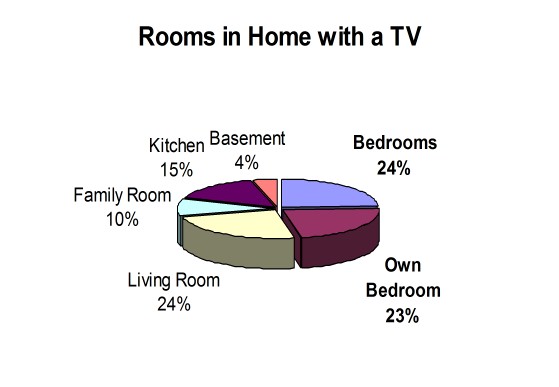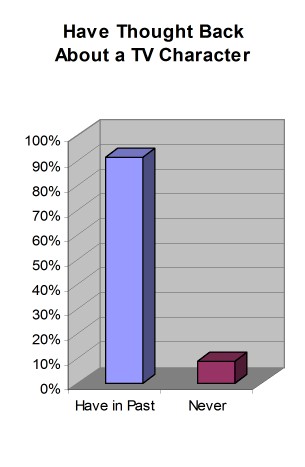Chapter 4: Question 2
2. In what ways have television and computers affected communication between people in our society?
For decades the living room and kitchen were the communal gathering places in the family home (Mander, 1978; Mander, 1996; Postman, 1986) where family members and friends could gather and communicate. With 100% of those surveyed stating that their living rooms house a television set and 64% of the kitchens, communication among people now is in competition with a mechanical guest that never listens and constantly talks, stifling true communication and placing strict restraints on content, length and depth due to the need of the viewer to maintain focus and quiet while glued to the program (Mander, 1978). Even as I interviewed Marie, I felt the competition of the television. Marie would lose track of what she was talking about and start to stare at the set and its every present drone of weather related news. When she realized that this had occurred numerous times she jumped up and turned off the volume, but the video portion remained on and her gaze still became fixated on the screen now and then. She commented about how she doesn’t watch much TV, mainly the Weather Channel and CNN. Ed reminisced about when he was growing up, "When I was a kid we weren't allowed to have the TV on when company came over… it would have been an insult to our guests… it would have seemed like the TV was more important to us than those who were over the house". "There was a time, back when I used to teach younger students, " remarked Frank, " when I once was talking with a little boy, I can't remember his name now, but… he was telling me how he hated it when he wanted to talk with his mom sometimes, but she kept telling him to be quiet because she was busy watching her show… I can remember that same empty feeling… how can a kid compete with a TV?"
Content of the conversations many times include the TV show and characters, with 79% percent of those surveyed saying that the commercials themselves are often the topic of a conversation with friends and family. "Sure, we often talk about what we watched last night…in the staff room…everyone watches something and its fun to laugh about what we all saw….", says Ann. People enjoy shared experiences, they enjoy talking about programs that they have watched, as Tina describes talking about TV, "It is like a 'pseudo-communal' experience…I feel like I'm doing something with others when I am really by myself". I asked Joe about how it would be if he didn't have a TV, his first remark was, "What would I talk about with my friends! Everyone would think I was weird!". "I wouldn't know what to talk about!" exclaimed Ann, when I asked her the same question.
Mealtime is not the only time where television has created a gulf, dividing members of a family. The survey results showed that in every home there was a TV in at least one of the bedrooms, while 97% percent of those interviewed had a television in their own bedroom. With 100% of the living rooms with a TV and 40% answering that they also had a family room with a TV in it, the family unit has been effectively divided into single, separate entities, each person isolated within separate rooms, alone, except for the one-way communicator…TV.

TV commercials are drawing interest among viewers with 85% of those whom I surveyed admitting that they've enjoyed the commercials more than the program that they had initially decided to watch and well over half of these viewers saying that most of the time the commercials are more enjoyable than any of the programming. Tina thought that commercials were more interesting than most of the regular programming, "There are some commercials that I actually look forward to seeing!" exclaimed Tina. I asked Frank to tell me a bit about some commercials that he can remember…" The commercials for the Super Bowl were great; did you know how much they are charged for just thirty seconds of airtime? I love the Bud Frogs, even my kids get a kick out of them…" Commercials, with a very precise message to convey (Rushkoff, 2001) are quickly becoming the main focus of the television viewer with a feedback loop built right into the message so that no matter where anyone goes the message is repeated over and over gain.
What was extremely interesting to me, though, was the type of descriptions that those surveyed wrote in themselves when asked to describe their favorite television commercial. Of those who gave descriptions of their favorite commercial, 89% failed to mention the actual name of the product being focused on. The only product that was named was "Bud Frogs", even by Frank during his interview. Knowing how deeply researched the market is by corporate-paid advertising agencies (Rushkoff, 2001), I started to think that the product name may not be the most crucial piece of information being taught in the commercial, but something entirely different. Marie told me about one commercial that "disturbs" her, she explained that it seems to be a commercial about skateboarding and the kids are all going in different directions, very quickly, on their skateboards. There is a lot of music played in the background. At the end, after a lot of flashing images, someone falls off of their skateboard and them someone else hits the fallen child, purposefully, with their skateboard…. then there is a message about Coke soda. Marie told me that she gets very upset each time that she views this commercial, "I don't know what all the things about skateboards has to do with Coca Cola!", remarks Marie.
The television characters have become important and real enough to the viewers that 100% of those surveyed can recall the character's names from most TV shows. More importantly, a vast majority, 91%, has actually thought about these fictitious TV characters after they were done viewing the program and while they were engaged in other activities. In my interviews these were some of the responses that I received from my question, "How far back in time can you remember a particular TV show and characters?" Ed stated that, "Hey, I can remember dancing around the room to the music when I was little and watched the show "The Mouskateers", I can remember everything about that show! I can remember watching "Captain Kangaroo…. I remember his shoe box full of crayons and the ping pong balls!". Marie reminisced about the old "Honeymooners" show that used to air when she was still a young bride. "That show is still my favorite…I can remember thinking how I would decorate their apartment if it were mine…. it helped me to forget how little money we had back then too!". Three quarters of those who answered the survey questions have gone so far to reflect back on a particular fictitious TV character and used that character's contrived personality traits as a guide, a role-model, for their own behavior when trying to work out a particular situation in their own, real-life world! Joe admits to making believe he was the main character on the movie "The Matrix". He told me that he liked to dress like the character and walk like the character…"in a cool floating kinda way…" Joe told me that when he is at his computer he pretends to be someone different, like "the dude on the Matrix". Tricia told me that she imagines herself like some of the skinny girls on the TV shows. She wears her hair like some of them, long and dyed white blonde. She wants to live like they do, "with friends all around and having fun all the time…always dressed in nice clothes…"

Where real people were the guiding force as role models prior to the television era, now, more and more people are using corporate-created virtual role-models, who's only connection to the real world is its marketing and or political message sponsored by a handful of transnational corporations (Bagdikian, 1992; Mander, 1992; Warrebey, 2000). Ed remembers back when he was a lot younger, when he used to pretend that he was like Clint Eastwood…"walking slow and quiet…not saying much…the tough guy…", Ed laughed when he said this, he said that he sees that he "was foolish to act that way back then." Ann mentions that when she gets down at work, tired from teaching, she makes-believe that she is in a movie, it helps her get through the day.
Over 50% of viewers actually have a favorite TV commercial with 79% discussing the theme, characterization and plot with their friends thus further embedding the commercial message into not only their own consciousness, but also instilling a sense of reality and substance to an unreal occurrence (Bushman, 1998; Buzzell, 1998; Iyenge, 1994; Kaufman, 2000).
What is the motivational draw? I ask of Ed, "Consistency", he says, "The same thing all the time, no real surprises… sure, new shows, but everything is still pretty much the same." The chats are a big draw, as I surmised through the observations at the high school. It is lunchtime…. A dozen students are sitting, staring at the library's computer screens, they are typing words quickly…. scroll, type, click, a frantic search through numerous email accounts to see if any new messages have arrived…. disappointment if they haven't. Very little hesitation, very little pause…click, scroll…. bodies slightly tilted forward, necks stiff, eyes staring… no facial expression, bodies motionless, except for the mouse hand and fingers flitting away at the keyboards…. The bell rings and 12 zombie-out teens file out of the library. Meanwhile, a small group of kids were sitting at a worktable with their books spread open in front of them. They face each other, these four students…. They smile, lean over and whisper quick sentences. There is movement, eye contact. The contrast between the two groups of students is immense. I asked Tricia how she normally feels after she'd been chatting on the Net for awhile, "Oh, well, like….I don't know, kinda…. Wired… I like chatting….my neck gets stiff, you know how it is….". I ask her if she feels that she had enough opportunity to say what she wanted to. "Yeah…no…I don't know…. I really don't have anything to say anyway….". Tricia describes the feeling of checking her various email accounts…."It's fun, I have about 6 or 7 accounts that I normally use. Some are for real… you know, those I use with people I really know…others are…well, not really me…. I'm someone else, I have a good time, it is fun being someone else, to pretend…. Everyone does it! I have a bunch of screen names".
Copyright 2001